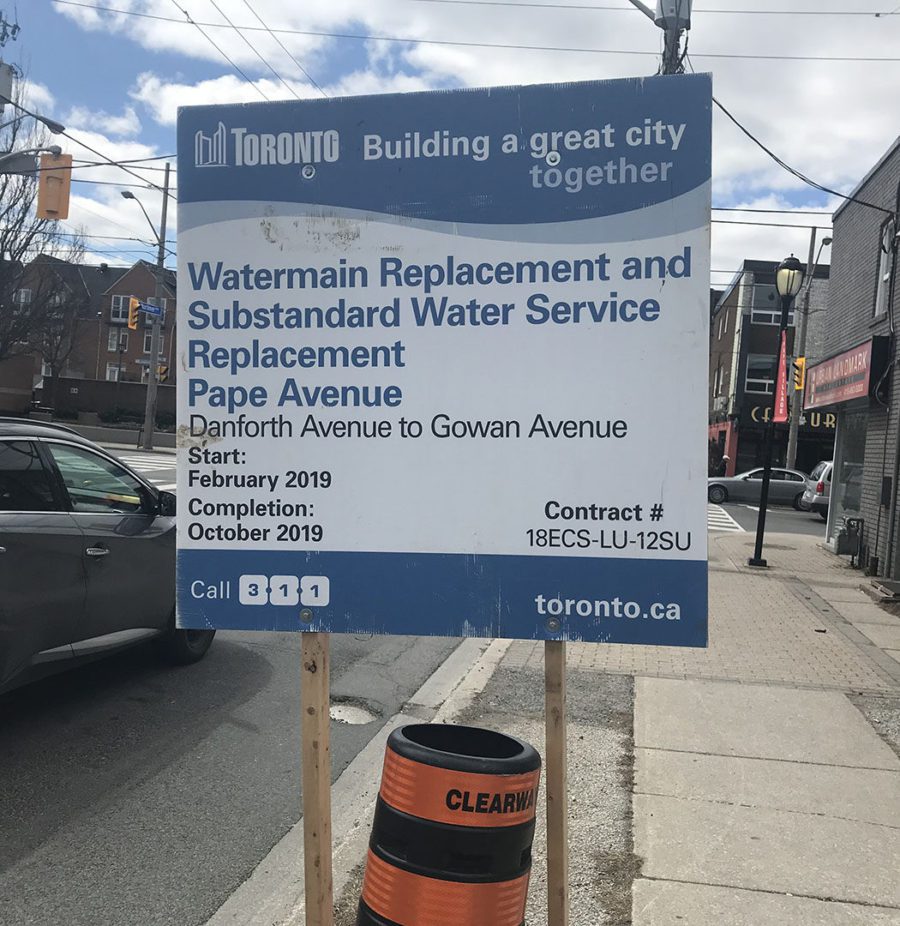Until construction notices were delivered, some East York residents were unaware that their tap water may contain lead, a toxin that can damage the nervous system.
“I don’t pay attention to that kind of stuff so I was totally unaware. I only noticed the construction getting off at Pape Station one day and that’s how I found out about all of this,” longtime East York resident Jaymie Sacobie said . “Now it has me thinking I could have been exposed to lead when I was pregnant or maybe my kids.”
According to Toronto.ca, pregnant women, children under six and infants fed formula made from tap water, are especially vulnerable to the effects of lead in residential drinking water.
“Elevated levels of lead in drinking water can have negative health effects on the development of the central nervous system, and fetal and brain development,” said Dr. Christine Navarro, a Toronto Public Health spokesperson. “If a young child has too much lead in the body, it can lead to a shortened attention span, intellectual and behavioural problems.”
The construction is part of the Council-approved 2018 Capital Works Program for watermain replacement. The pre-construction notice, distributed in late December 2018, stated water supplied to houses built before the mid-1950s may contain lead. This is due to the decades old pipes corroding and causing lead particles to break off into the water supply.
On Feb. 18 construction began on Pape Avenue near Danforth Avenue, fulfilling part of the city’s promise to replace its lead pipes. This watermain replacement is scheduled to be completed in late September.

Construction is underway on Pape Ave. to replace watermains. (J. Diamond Daniel/Toronto Observer)
The city has dedicated sections on its website to educating its residents about lead and drinking water. The city is also committed to doing its part in ensuring its water is safe to drink.
“Tap water in Toronto is continuously tested, monitored and analyzed to ensure it meets the strict standards of Toronto Public Health, the Province of Ontario and Government of Canada,” said William Fernandes, the city’s director of water treatment and supply.
In December 2014, under the province’s mandatory Safe Drinking Water Act, the city began adding phosphate to the water through a corrosion control program.
“As an additional measure of protection, a food grade additive of phosphoric acid is added to the treatment process. This helps create a protective coating inside all pipes and household plumbing fixtures, which helps to reduce the potential for lead to enter tap water,” Fernandes said. “This way, if lead-free, treated water enters lead pipes, then those pipes are less likely to corrode.”

Construction equipment on Pape Avenue waits to be used for watermain replacement to remove lead pipes and lead in tap water. (J. Diamond Daniel / Toronto Observer)
To avoid the same issue from recurring, copper pipes will be replacing the current lead pipes. This only takes care of the city’s property and its side of problem.
The city’s website states that lead particles can enter residential water once a pipe is cut to replace one portion. This can create two problems for homeowners: a potential spike in lead levels and a possible plumbing bill of around $3,000. Property owners with lead pipes are encouraged to coordinate with the city and have their old pipes replaced. Homeowners will have to pay out-of-pocket and there are currently no programs in place to help with the cost.
The city is aiding where it can and has implemented a faucet filter program which provides homeowners with a free faucet filter to remove lead once the watermain replacement is complete. All Toronto residents can also receive free lead-testing kits and results courtesy of the city.
Visit toronto.ca for more information on lead and drinking water.

